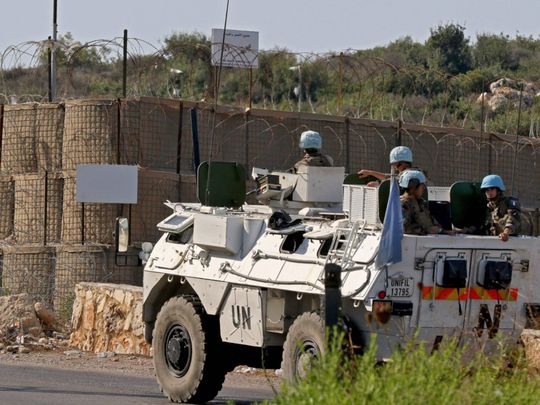
Tel Aviv: Israel’s defence minister warned on Thursday that his country is prepared to strike Iran, issuing the threat against the Islamic Republic after a fatal drone strike on a oil tanker at sea that his nation blamed on Tehran.
The comments by Benny Gantz come as Israel meanwhile lobbies countries for action at the United Nations over last week’s attack on the oil tanker Mercer Street that killed two people. The tanker, struck off Oman in the Arabian Sea, is managed by a firm owned by an Israeli billionaire.
The US and the United Kingdom similarly blamed Iran for the attack, but no country has offered evidence or intelligence to support their claims. Iran, which along with its regional militia allies has launched similar drone attacks, has denied being involved.
Speaking to the news website Ynet, Gantz responded to whether Israel was prepared to attack Iran with a blunt “yes.’’
“We are at a point where we need to take military action against Iran,” Gantz said. “The world needs to take action against Iran now.’’
Iran did not immediately respond to Gantz’s comments. However, in a letter on Wednesday to the UN Security Council, its charge d’affaires in New York described Israel as “the main source of instability and insecurity in the Middle East and beyond for more than seven decades.’’
“This regime has a long dark record in attacking commercial navigation and civilian ships,’’ Zahra Ershadi wrote. “In less than two years, this regime has attacked over 10 commercial vessels carrying oil and humanitarian goods destined to Syria.’’
Ershadi’s comments refer to an ongoing shadow war being waged on Mideast waterways since 2019 that has seen both Iranian and Western-linked ships attacked.
Last week’s attack killed the vessel’s Romanian captain as well as a British crew member who worked for Ambrey, a maritime security firm. In a statement Thursday, Ambrey identified the victim as Adrian Underwood, a former soldier in the British Army who started at the firm as a maritime security officer in 2020 before becoming a team leader.
“We continue to be in contact with Adrian’s family to offer support at this sad and difficult time,” said John Thompson, Ambrey’s management director.
The attacks began a year after then-President Donald Trump unilaterally withdrew from Iran’s nuclear deal with world powers, which saw Iran limit its enrichment of uranium in exchange for the lifting of economic sanctions. President Joe Biden has said he’s willing to rejoin the accord, but talks over salvaging the deal have stalled in Vienna.
Meanwhile, Israel on Thursday escalated its response to rocket attacks the previous day from Lebanon by launching rare airstrikes on its northern neighbor, the army and Lebanese officials said.
A statement from the Israeli military said jets struck the launch sites from which the rockets were fired, as well as an additional target used to attack Israel in the past. The military blamed the state of Lebanon for the shelling and warned “against further attempts to harm Israeli civilians and Israel’s sovereignty.’’
The overnight airstrikes in southern Lebanon were a marked escalation at a politically sensitive time. Israel’s new eight-party governing coalition is trying to keep peace under a fragile ceasefire that ended an 11-day war with Hamas’ militant rulers in Gaza in May. Several incidents leading up to this week’s rocket fire from Lebanon have focused attention on Israel’s northern border. The United States swiftly condemned the attacks on Israel.
Lebanon is mired in multiple crises, including a devastating economic and financial meltdown and a political deadlock that has left the country without a functional government for a full year.
Lebanese President Michel Aoun said Israel’s use of its air force to target Lebanese villages “is the first of its kind since 2006 and indicated the presence of aggressive, escalatory intentions’’ against Lebanon. In a statement, he said Lebanon would submit a complaint to the United Nations.
The commander of the UN peacekeeping force in Lebanon, known as UNIFIL, Stefano Del Col, called on the parties “to act with urgency’’ to de-escalate tensions and prevent violations of the cessation of hostilities that has been in effect since 2006.
Israel and the Lebanese militant group Hezbollah fought a devastating, monthlong war in 2006 which killed some 1,200 Lebanese, mostly civilians, and around 160 Israelis, mostly soldiers. The war failed to neutralize the group’s rocket threat, and Israeli officials say the Iran-backed Hezbollah’s improved missile arsenal is now capable of striking virtually anywhere in Israel.








